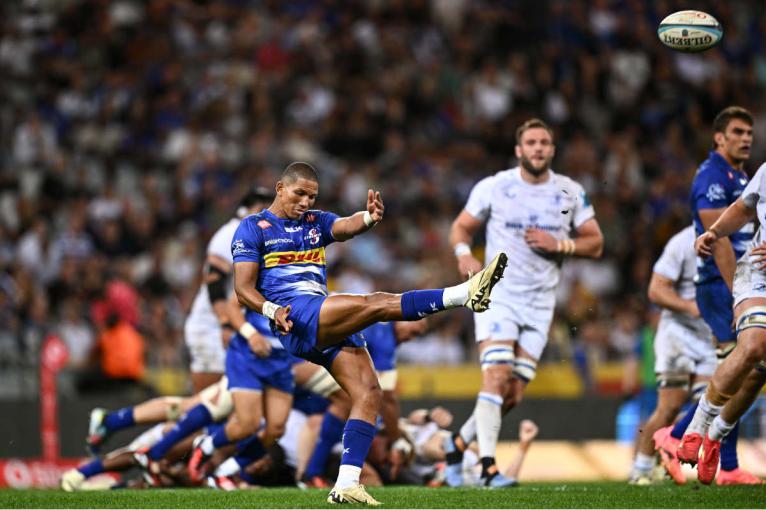“You can go to a random braai anywhere in the country and, if you stick around long enough, you’re going to land up in a scrum.”
In the build up to his URC quarter-final showdown against Glasgow Warriors, Stormers tighthead prop, Neethling Fouche, paints a quintessentially South African scene.
“It’ll be late in the evening. The chops and wors would already have been eaten but there’ll still be a fire going. Then an oom [uncle] will call you over to show you how he used to do it back in the day. He won’t put his brandy and coke down and he won’t spill a drop. But he will get you and other okes to crouch into a scrum. He’ll go in on the angle and make life uncomfortable for you.”
South Africa, more than any other rugby nation, reveres the brutal set piece as an art form. It is not merely an occasion to clump 16 large humans together in order to restart the match. It is an integral component of the game. A craft that requires dedication and admiration. An expression of dominance and a potent weapon on the path to glory.

Fouche didn’t always chime with this outlook. In his youth, where he played provincial representative rugby from the age of 13, he was a freewheeling, ball-carrying, rampaging prop.
“Scrumming wasn’t something that I took very seriously,” he admits. “Obviously as a prop it was something I had to know how to do, but it was just part of my job. I just wanted to get down there and get the ball out as quickly as possible. It wasn’t until I went to the Stormers [in 2017] that I began to take it seriously.”
Cape Town is South Africa’s most glamorous city. With its staggering mountain, vineyard-filled valleys, cliffs that disappear into the azure of the Atlantic and a summer sun that sets well past happy hour, the so-called Mother City is the nation’s crown jewel. As if compelled to keep up with its surroundings, the city’s rugby team has historically pursued a cosmopolitan brand.
Scrumming isn’t always sexy. Often it’s just six big fat guys crashing into each other.
“Western Province rugby has been known for running rugby,” says the Stormers’ forwards coach, Rito Hlungwani, who has climbed the union’s coaching ladder since 2015. “The mantra has been to entertain. There’s an expectation. Fans want to be thrilled and that means giving the ball air and looking to score these brilliant tries.”
Think Percy Montgomery with his flowing blond hair and Bobby Skinstad with his pierced tongue jutted out whenever he scored a zig-zagging try. “There’s a sexiness to our game,” Hlungwani explains. “Scrumming isn’t always sexy,” adds Fouche. “Often it’s just six big fat guys crashing into each other.”
Beast mode from @evanroos4 #STOvLIO #iamastormer #dhldelivers @Vodacom #URC pic.twitter.com/VbZOwCry2p
— DHL Stormers (@THESTORMERS) June 1, 2024
But this mindset had already shifted by the time Fouche left the Bulls and headed south. He entered a dressing room that was already cramped by Steven Kitshoff, Frans Malherbe, Bongi Mbonambi, Wilco Louw and Oli Kebble.
“I was shitting myself in those early years,” Fouche says. “I’d struggle to sleep on a Monday night because I knew on Tuesdays we did scrum training and I’d have to scrum against those guys. It was terrifying. For three years it was a struggle.”
When the 2020 Super Rugby season was brought to a halt by the Covid pandemic, Fouche and the rest of his squad were confined to their homes. While attending a digital sermon delivered by his pastor, the maturing tighthead had an epiphany. On his screen his church leader on his screen asked the congregation what sort of legacy they’d leave behind once the world returned to normal. How would they look back on their enforced period of isolation?
I packed down and was staring at Kitsy [Kitshoff] and, I don’t know, it’s like the pieces fell into place. I got the better of him once. Then I did it again. When we got up that second time he tapped me on the back and said, “Chom [slang for ‘mate’], this is it! You’ve got it!
“I vowed then and there to work my arse off,” Fouche declares. “I built this makeshift gym in my garage with borrowed weights. I did core work with my wife. I told myself that a lack of hard work wouldn’t be the reason I didn’t make it. I’d be fine if I wasn’t good enough. But I wouldn’t give myself any excuses.”
When he emerged from lockdown he was transformed. So too was the dressing room which now had a vacancy after Louw left for Toulon and then Harlequins. It was during one scrum training session that something finally clicked.
“I remember [former Springboks coach] Nick Mallet was on the side and doing some consulting and all I could think was, ‘Don’t embarrass yourself’,” Fouche recalls. “Then I packed down and was staring at Kitsy [Kitshoff] and, I don’t know, it’s like the pieces fell into place. I got the better of him once. Then I did it again. When we got up that second time he tapped me on the back and said, “Chom [slang for ‘mate’], this is it! You’ve got it!’

“It’s amazing how just two scrums can change your life. Now I’m a total scrum nerd. It’s an obsession. My teammates tease me because I can talk about scrums non-stop for hours.I’m now always chasing that perfect scrum and the best part is I know I’ll never get it because there’s always something you can get better at. You can always get your hips or back or shoulder into a better position. I love that there’s no such thing as a perfect scrum.”
The Stormers’ scrum stats from the just completed URC league campaign attest to that. They top the 16-team competition with 49 scrum penalties won, which is perhaps no surprise given the personnel at their disposal and the passion that the set piece elicits.
We’re aggressive with every scrum. We’re going for it with everything we’ve got. That’s the message from Dobbo.
What is surprising, though, is they’re ranked 14th when it comes to scrum percentage, having claimed the ball back or procured a penalty just 88% of the time. How can the potent scrum in the league also be among the most porous?
“It’s an attitude thing,” explains Hlungwani. “Our approach is we’re going for that scrum penalty every time we pack down. We might go early or we might lose our feet or do something else that gives away a penalty. But we’re aggressive with every scrum. We’re going for it with everything we’ve got. That’s the message from Dobbo [head coach, John Dobson].”
Fouche picks up the narrative: “You can feel it from the home crowd at DHL Stadium whenever we get a scrum. It’s like when a batter in cricket is on 99. There’s this level of expectation that something is going to happen. That energy is felt by the players and you start to look at the opposition and you can tell that they know something serious is coming for them. I’m not afraid to give away a penalty because I know, at the end of the game, we’ll win more than them.”

Before Rassie Erasmus and Jacques Nienaber implemented the Bomb Squad tactic with the Springboks in 2019, where entire front rows were replaced in a single stroke in order to maintain maximum efficiency in the scrum throughout the match, this set piece did not fully capture the imagination of the South African public. It was respected, and those who held it up were given their dues, but scrums were a moment to top up one’s drinks at the braai, rather than edge closer to your screen in anticipation. Before 2019, the most memorable contribution from a South African prop was delivered by Richard Bands when he bulldozed over Carlos Spencer in 2003 to score a stunner against the All Blacks.
Then Tendai Mtawariwa consumed Dan Cole in Yokohama en route to a 32-12 win in the World Cup final. Four years later, Ox Nche stepped off the bench to wrestle back a semi-final victory over England. “They made scrums sexy,” says Fouche. “Ox said that salads don’t win scrums. Everyone loves props now! I reckon there are loads of youngsters who can’t wait to join the front row. Even some in Cape Town.”
When I close my eyes and imagine wearing that green jersey, I’m squatting low down, with my shoulder next to my hooker and me ready to get stuck into the oke in front of me.
Fouche’s shift in attitude and aptitude has seen him earn a Springboks alignment camp call-up. The front row is arguably the most competitive space in the national side, but he believes he’s ready to make the step up.
“I used to dream of running into space, knocking guys over, scoring tries for the Boks,” he says. “Now, when I close my eyes and imagine wearing that green jersey, I’m squatting low down, with my shoulder next to my hooker and me ready to get stuck into the oke in front of me. There’s really nothing else that can compare to that feeling.”


Neethling Fouche has improved so much this season. His battle with Jamie Bhatti in the URC quarter final will be good to watch.